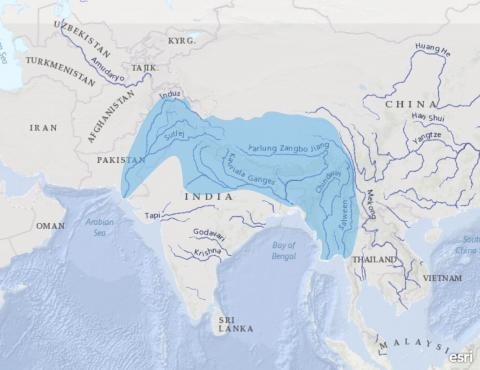Important Facts For Prelims
Hindu-Kush-Himalayan Region
- 09 Oct 2019
- 3 min read
The India Meteorological Department (IMD) will collaborate with meteorological agencies in China and Pakistan, among others, to provide climate forecast services to countries in the Hindu-Kush-Himalayan (HKH) region.
- The World Meteorological Organisation (WMO) has proposed for establishment of regional climate centres in Islamabad, Delhi and Beijing.
- These centres are expected to provide forecasting services and climate analyses.
- They would also provide data sharing services, training and capacity-building, research and development.
Hindu-Kush-Himalayan (HKH) Region
- The HKH region spans Afghanistan, Bangladesh, Bhutan, China, India, Kyrgyzstan, Mongolia, Myanmar, Nepal, Pakistan, Tajikistan, and Uzbekistan.
- It traverses about 5 million square kilometres and hosts a large and culturally diverse population.
- It is considered the Third Pole (after the North and South Poles), and has significant implications for climate.
- It contains vast cryospheric zones and is also the world’s largest store of snow and ice outside the polar region.
- A recent report by the Intergovernmental Panel on Climate Change has highlighted the threat to the HKH region from global warming.
- Floods would become more frequent and severe in the mountainous and downstream areas of the Indus, Ganges and Brahmaputra river basins, because of an increase in extreme precipitation events.
- Also, the severity of floods is expected to more than double towards the end of the century.
India Meteorological Department
- It is the principal agency under the Ministry of Earth Sciences (MoES), Government of India responsible for meteorological observations, weather forecasting and seismology.
- It is headquartered in Delhi and operates hundreds of observation stations across India and Antarctica.
- It is also one of the six Regional Specialised Meteorological Centres of the World Meteorological Organization.
- It also has the responsibility for forecasting, naming and distribution of warnings for tropical cyclones in the Northern Indian Ocean region, including the Malacca Straits, the Bay of Bengal, the Arabian Sea and the Persian Gulf.
World Meteorological Organization
- The World Meteorological Organization (WMO) is an intergovernmental organization with a membership of 193 Member States and Territories.
- Established by the ratification of the WMO Convention on 23 March 1950, WMO became the specialized agency of the United Nations for meteorology (weather and climate), operational hydrology and related geophysical sciences.
- It is headquartered in Geneva, Switzerland.




